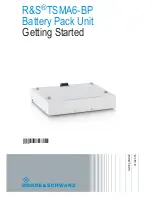
KC-P30 Charging Station
Auxiliary device
V1.03
24
© KEBA
3
Charging duration
Since the charging station only supports synchronization states
U
and
I
, the
charging duration must not be used for billing.
The charging duration describes the duration between defined states
[re-
mote]StartTransaction
and
[remote]StopTransaction
. The states are
defined by the OCPP backend. This means that the charging duration de-
scribes the duration of an OCPP transaction.
As a result, the charging duration also includes the following break states,
which can either come from the vehicle, the charging station or the OCPP
backend:
●
Charging process was interrupted
●
Charging process was paused by the vehicle or charging station due to
a temperature violation
●
Charging process is in the queue because of load management in the lo-
cal charging network
The charging duration does not describe:
●
Connection duration: The vehicle is typically connected to the charging
station for longer than the charging process takes. The charging process
does not begin until after authorization. The charging process can be
ended by unplugging, although the vehicle may remain plugged in after
the end of the charging process.
●
Parking duration: The entire duration for which the vehicle is parked at
the spot next to the charging station.
4
Error indicator
The error indicator indicates that an event occurred during a charging ses-
sion, which is why the displayed variable cannot be used for billing.
●
E
... Energy: The energy in the data record must not be used for billing.
4.3
Generation of log data records
In addition to a measurement data record, a log data record can also be
generated and signed. Log data records are permanently stored in the mea-
surement capsule.
A log data record contains the following information:
OCMF|
{
"FV":"1.0",
"GI":"KEBA_KCP30",
"GS"::"1234",
"GV:"1.0",
"PG":"L43",
















































